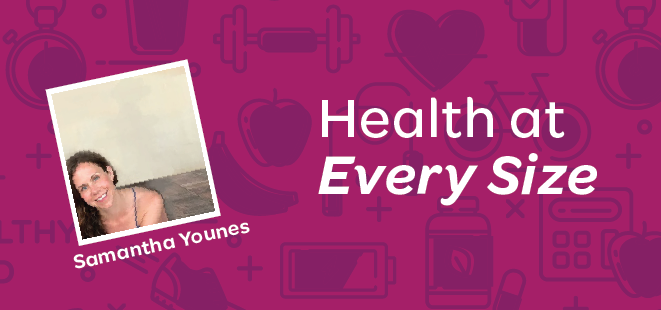Compassionate care is the best way forward

Knowing friends with larger bodies at a very young age, Moda Health's Samantha Younes never forgot how they were treated by others. It's something that's always stuck with her, and continues to motivate her as a healthcare professional to this day.
"I saw firsthand that these intelligent, kind and dynamic people were literally just being ignored by our community because of the way they looked," she said. "Personally, that's always been in my mindset. And professionally, it just kept coming up."
As a health coach, Samantha is passionate about making sure people living in larger bodies are treated with dignity and have access to the high-quality care they need. With a background as a personal trainer, nutritionist and a cancer exercise specialist, she recently took a course with Health at Every Size (HAES), an international grassroots movement that advocates access to high-quality, compassionate and high integrity healthcare for people living in larger bodies. She said HAES is focused on lifting the shame off of being overweight and moving away from a fat-phobic society.
"There's so much research on the harmful impact of living with a larger body and getting access to healthcare," she said. "HAES is lifting the framework away from shame and the biases of people living with larger bodies, and approaching them with compassion and understanding care."
The truth is, fat-shaming biases are everywhere. From mass media to the popular healthcare tool, the body mass index (BMI), Samantha said society has created a stigma for people living in large bodies. These hurtful images, unnecessary words and unrealistic numbers have impacted the way people living in large bodies see themselves and manage their health.
"Often, people living in a larger body avoid their primary care visits because they have so much shame around their size," she said. "They've also been demeaned by doctors for years. If they are coming in with an intimate health concern and the doctor is spending 20 minutes talking about their BMI or basically shaming them for their weight, they never feel open enough to just discuss their health concerns."
One of the goals of HAES is to educate providers about compassionate, impactful care for patients with larger bodies.
"Historically, primary care physicians have received very little training around nutrition or trauma-informed care," she said. "A study found that there's an implicit bias if a doctor is working with a larger individual that they are less intelligent, they're lazy, and they don't have the discipline. Basically, anything that's happening to them, health-wise or medically, is essentially their fault. If you've been living in a larger body for many years, you've definitely been a victim of a lot of trauma. HAES teaches providers how to approach and connect with someone who's suffering in some way, and provide compassionate care when talking to people about their weight or who have a larger body."
Samantha said the past year and a half has also opened her eyes to how we treat and value each other.
"COVID has created such monumental pause for the entire planet, and made us reflect on how we treat ourselves, how we treat our body, how we treat other people, and how we value the importance of other people's bodies," she said. "It's certainly shown a lot of cracks in health equity, in every sense, including health equity, racially, socio-economically, LGBTQ+ people, for people living in larger bodies, and for people with intellectual or physical disabilities. It really changed the lens for me about how to get people access to high-quality care."
As a member of Moda's Diversity, Equity and Inclusion (DEI) Committee, Samantha said self-reflection is a necessary step for moving in the right direction.
"We all need to work on how we feel about people living in larger bodies," she said. "We've all been exposed to these unrealistic expectations. Part of our DEI strategy is to humbly accept any ignorance or blind spots we have, learn from that and figure out how we can do better moving forward."
Along with putting her HAES training into practice, Samantha said she continues to learn about the barriers that prevent people living in large bodies from living healthier lifestyles.
"Almost all of the members I work with are dealing with weight stigma, whether it's someone who needs to lose weight or needs a necessary surgery. These things hold a lot of shame for them," she said. "The food system, and access to high-quality nutrient dense food, is why many people are overweight and undernourished. Plus, there's a huge equity problem. We need to make high-quality nutrient dense food affordable and accessible, and we need to pass that knowledge on."
Samantha shared a few tips on how we can all learn to be more understanding, accepting and compassionate to people living in large bodies.
- Acknowledge and reconcile your own fat-phobia. This will translate to your co-workers, your personal life, your family and how you interact with others.
- Get away from the idea that there is an ideal weight. There is no ideal body or ideal number. Everyone is different. Accept and respect others how they are.
- Practice compassion. It's the best way forward.
In order to be more compassionate towards others, Samantha added it's important to understand and remove harmful information that we've been exposed to for far too long. Moving forward, we need to learn how to accept all people the way they are and treat them with compassion and dignity.
"As a society, we really still think that thin is good and better, and overweight is somehow morally bad," she said. "We clearly spend billions each year on diets that don't work. I don't argue with the studies that show the impact that obesity has on people's health because the data is there. But when somebody's weight is negatively impacting their health, the way we as practitioners and health professionals have been approaching this is not working. We need to learn to continue growing and learning how to better deliver compassionate, impactful care."
Moda Health Months: Our health stories
To read more stories, please visit our Moda Health Community page.

Hello.
We have exciting news to share. ODS is changing its name to Moda Health.
Moda comes from the latin term "modus" and means "a way". We picked it because that's what we are here to do: help our communities find a way to better health.
Together, we can be more, be better.
Please select the state you live in, or the state where your employer is headquartered, so we can tailor your experience:

Hello.
Please select the state you live in, or the state where your employer is headquartered, so we can tailor your experience:
Privacy notice
We use cookies and similar analytics technologies to understand how visitors interact with our website, improve performance, and enhance user experience. These tools help us analyze traffic patterns and usage trends.
We do not collect or store personal information, track users for advertising purposes, or use social media plugins.
By continuing to use this site, you acknowledge our use of cookies for analytics purposes only. For more information, please refer to our Privacy Policy.
Changing your location to Oregon
You can return to your previous location in the site header.
